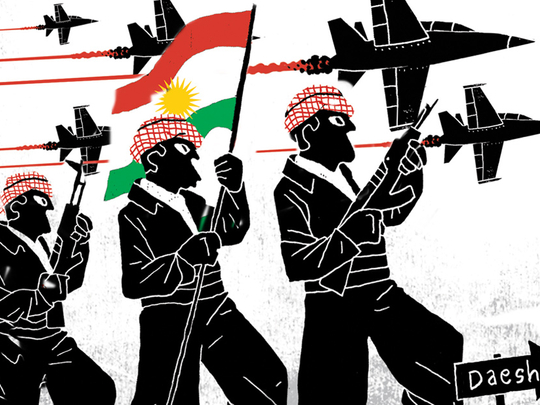
It is undoubtedly most reassuring to eventually see some serious action taken by the US against the ruthless savage militia of Daesh (Islamic State of Iraq and the Levant). What makes this significant development a probably historic turning point in America’s Middle East policy is the effective and direct participation of five Arab countries in the action. Supported by Congress, US President Barack Obama has at last taken the long-awaited decision to launch air strikes against Daesh targets. Unlike the last two Gulf wars, this is the first time that Arab countries like Saudi Arabia, the UAE, Qatar, Bahrain and Jordan have effectively joined the US in the air strikes.
The US president of 2014 suddenly seems to be remarkably different from the Obama of 2013. When the president went to the opening of the United Nations General Assembly last year, he was unable to recruit any meaningful international support to tackle two persistent issues then. First, to hit targets of Syrian President Bashar Al Assad in response to his regime’s use of chemical weapons against his own people. Second, to intervene on the side of the struggling Syrian opposition, desperately in need of vital assistance. To make a bad situation worse, the British House of Commons, responding to a motion by the opposition Labour Party, overwhelmingly vetoed the motion in August 2013 and voted against any military strike in Syria.
While the coalition, with its continuous air strikes, can help to degrade Daesh and its associates in Syria and Iraq, the air strikes themselves, as generally agreed, are not sufficient to finish off the militants. They may limit Daesh’s ability to find new recruits and access to financial resources, but this depends largely on Turkey, which is yet to specify its contribution to the coalition efforts. Now with its hostages released by Daesh, Turkey has no excuse to refrain from joining the coalition.
In fact, many look suspiciously at the Turkish government of President Recep Tayyip Erdogan’s actions over the last three years. Turkey’s long border with both Syria and Iraq is the only safe crossing to and from both the countries, particularly for the many thousands of Daesh members who carry western passports. Recently, the Turkish government came under unprecedented criticism for not taking adequate measures to improve restrictions at border crossings. The US president, in his address to the UN General Assembly, said the number of foreign members now fighting alongside Daesh is about 15,000. The vast majority of these recruits carry western passports, which makes it easy for them when crossing to northern Syria through Turkish border check points.
He outlined the problem as a “global issue” which requires “global action”. He is absolutely right. By changing its name, the Daesh group is declaring itself to be of a transnational nature, founded on belief rather than nationality. Therefore, its aims and ambitions are global. Obama also sets the priorities for the current phase of the war against Daesh by concentrating on striking the terrorist group now and leaving the fate of Al Assad’s regime to deal with later. After all, the rapid rise of Daesh, particularly over the last five to six months, is ironically the West’s responsibility. Having created a non-functional state in Iraq after the total destruction of the country’s infrastructure through the 2003 invasion, and aiding Islamist militants — rather than the newly-born moderate and secular opposition — against Al Assad’s tyranny, the West made Daesh’s rise possible.
Proven capability
However, the big question now is how can Daesh be defeated? America and the coalition desperately need local forces from the region to participate as this “is not America’s war alone”, as Obama explained. With the obvious inability of the government in Baghdad to deploy any significant military force, and vastly disintegrated Syria — with the Damascus government’s lack of authority over two thirds of the country’s territory and the coalition pledge of “no boots on the ground” — it seems there is no other power in the region to rapidly provide the urgently needed force, except the regional government of Kurdistan.
The Kurdish peshmerga (army) has already proven its capability in solidly stopping Daesh’s advances into the oil-rich area of Kirkuk and some towns and villages near Mosul. Now with the apparent formation of local militia among Syrian Kurds in the north-eastern part of Syria and the discrete crossing of several hundreds of Turkish Kurds to join their Syrian brethren, the Kurds could provide the first meaningful fighting force against Daesh on the ground.
In fact, there is no other similar force around. This seems to be the only practical alternative to having “boots on the ground”. The only people who are familiar with the terrain and the political geography of that part of the region are the people who live there. If Turkey changes its current policy and openly allows some of its millions of Kurdish citizens to actively join the fight against Daesh, it will make a remarkable difference to this war.
Mustapha Karkouti is a former president of the Foreign Press Association, London.









